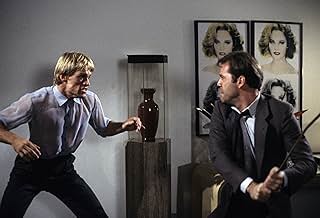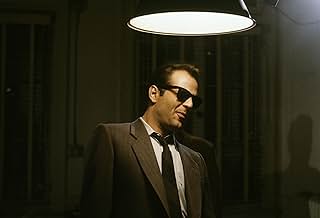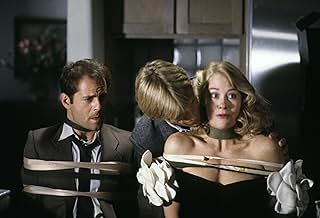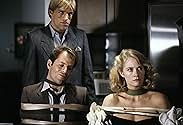Die kuriosen Fälle eines ehemaligen Modells und eines intelligenten Detektivs, der eine private Detektei leitet.Die kuriosen Fälle eines ehemaligen Modells und eines intelligenten Detektivs, der eine private Detektei leitet.Die kuriosen Fälle eines ehemaligen Modells und eines intelligenten Detektivs, der eine private Detektei leitet.
- 6 Primetime Emmys gewonnen
- 19 Gewinne & 60 Nominierungen insgesamt
Empfohlene Bewertungen
By the third episode it was clear they were on to something original, or if not completely original, at least written and executed better than anything else on TV at the time. The Tracy-Hepburn like sparring between Shepherd and unknown actor Bruce Willis, and the sophisticated writing by Caron and the other writers just got better and better as they finished their first half season of ten episodes.
The highlight of that first batch was the celebrated "black and white" episode, "The Dream Sequence Always Rings Twice." In it Maddie and David interview a client who owns a once famous LA nightclub (like the Coconut Grove), which is about to be torn down. There they learn of a mysterious murder that occurred there in the 40's, still unsolved, that revolved around a trumpet player having an affair with the band's married girl singer. The singer's husband was killed and both the trumpet player and the songstress claim the other did the deed. Of course David assumes the woman framed the musician. Maddie feels it was much more likely the sleazy guy did it. Each of them daydream their version of events in 1940's black and white, with Bruce playing the trumpeter and Cybill the singer. Each of their mini-stories works as film noir homage, and the pairing of the two versions come off even stronger. In addition it allowed us to see David and Maddie in a romantic setting without having to put the characters directly into that kind of plot killing situation. The episode won Emmy nominations for everyone involved, including Cybill and Bruce. Bruce won.
Which brings up "the troubles." How many giant egos can one series sustain? Tension began to mount between Shepherd, Willis, and Caron. Cybill was the "star" - but she was essentially playing straight man to Willis. His manic character and split second timing were the force driving the chemistry forward. By the time they were filming the first full season - he was as recognizable as she was. And after years of struggling and starving in New York - he was enjoying every minute of his new found fame.
And then there was Glen Gordon Caron. He was very much a "hands on" producer and had very definite ideas about where he wanted to take the series. His perfectionism frustrated his cast and writers. Several times the crew would begin filming an episode while the writers were still writing. Caron had a commitment to the network for 22 episodes per season. He never delivered more than 20. His shooting regularly went off schedule and over budget. The quality was there on the screen ("Atomic Shakespeare" - a riff on the Taming of the Shrew was practically a movie in and of itself), but the show began to tick off viewers who complained about all the reruns while they waited for a new episode.
As the series moved into its second full season it hit a creative peak:
· The aforementioned Taming of the Shrew
· Big Man on Mulberry Street - with a musical sequence by "Singing in the Rain" director Stanley Donen
· The four Sam and David and Maddie episodes with Mark Harmon as the straight up astronaut whose proposal forces Maddie and David to confront their feelings.
Then it happened. A confluence of events that seemed to drain the show of all its life:
· Maddie and David "did it" - killing off the eternal suspense.
· The writers, tired of all Caron's tirades and very much in demand with all their Moonlighting awards, left the series. Caron had to bring in a fresh crop.
· Cybill Shepherd became pregnant with twins. The timing of the pregnancy would prevent her from filming between September and at least December - a prime production period.
· Glen wrote the pregnancy into the show - and had Maddie flee LA for home - for months. This allowed him to film Shepherd's scenes alone during the summer. Of course with 3000 miles between Maddie and David it's hard to get much zippy chemistry going.
Coming from the creative high of the second season, the letdown in the third year was all the more apparent. By the time they dumped the baby (a miscarriage) at the beginning of the fourth season - the magic was clearly gone. Shepherd and Willis were anxious to move on to more lucrative film projects, and the final season was only a slight improvement over the disappointing previous year.
But, as the nursery rhyme goes - when it was good, it was very very good. In addition to the episodes mentioned above, try to catch some of these on cable:
· "My Fair David" - Maddie bets David can't go through a week without breaking out into some Motown ditty, or making crass sexist comments.
· "Devil in the Blue Dress" with Judd Nelson and Whoopie Goldberg
The show's troubled backstage production is the stuff of legend (if Sky 1 viewers think the arrival of new episodes of "The Simpsons" is an event, they don't remember this show's travails - a new episode on ABC was practically a headline story); so self-reverential was "Moonlighting" that the episode "The Straight Poop" was actually about the show's backstage drama, with Rona Barrett (real-life gossip maven) hosting and interviews with Cybill Shepherd's ex Peter Bogdanovich and, amusingly, Pierce "Steele" Brosnan. But though the problems really affected the show to the extent that some episodes had to focus on David and Maddie's secretary Agnes and the agency's new recruit Herbert, it never really became unwatchable.
And at its best, "Moonlighting" was a gem; with dazzling wordplay, real sparks between Bruce Willis and Cybill Shepherd (although Shepherd never getting recognised by the Emmys was justified), and some occasionally good mysteries to boot. Listing all the highlights the show produced would take too long, but the show deserves its place in history for, among others:
1. "It's A Wonderful Maddie": Maddie finding that in an alternate timeline the Blue Moon Detective Agency has been taken over by Jonathan and Jennifer Hart (Maddie and Max together: "Don't I know you from somewhere?") and that David has wound up marrying Cheryl Tiegs - a much better choice than Cybill Shepherd methinks.
2. "The Murder's In The Mail": For the "man with a mole on his nose" scene with the doorman.
3. What the narrator at the start of one of the episodes called "those silly chases they like to do on 'Moonlighting'."
4. "Atomic Shakespeare": In which a boy who has to miss "Moonlighting" to study "The Taming of the Shrew" leads us into a very amusing reshaping of the yarn ("10 Things I Hate About You" was good, but can that give you a medieval wedding ceremony with "Good Loving"?).
5. The movie-length pilot, complete with the full version of the wonderful Lee Holdridge-Al Jarreau theme song over the credits.
6. "The Dream Sequence Always Rings Twice." Orson Welles and Bruce Willis. A match made in heaven.
7. "Camille": Especially the climax.
Bruce Willis can look back on this with pride; Cybill Shepherd had nowhere to go but down. And the show's writers (Caron, Jeff Reno and Ron Osborn, Roger Director, Chris Ruppenthal, Debra Frank and Carl Sautter...), I salute you. A true classic.
Too bad the Anselmo case was never solved, though.
A great detective show from my youth. More a comedy than a drama, the humour was great, the relationship and banter between Maddie Hayes (Cybill Shepherd) and David Addison (Bruce Willis) was very engaging and it was simply great fun.
It also launched the career of Bruce Willis, to the show's detriment. Die Hard was released around seasons 3 and 4 and from then on sadly the writing was on the wall for the show as he was clearly destined for bigger things.
So much on TV nowadays is either over-the-top dramatic, or toilet humor. No one knows how to just have fun anymore. Moonlighting never forgot that it was just a television show, and it didn't mind poking fun at itself. Some lines that demonstrated this were, "Two teams [...] with the same story. Either someone's lying or the writers just Xeroxed the other scene", and, "What do we do now?" "Wrap this up in about 12 minutes so another show can come on the air."
After David and Maddie got together, then weren't together, then were, how did it end anyway? The show became a bit of a soap opera. But it was always a treat to watch. Everyone mentions Moonlighting's version of "The Taming of the Shrew." Some of my other favorite episodes are "The Bride of Tupperman", which ends with a hospital scene chase to 'Dem Bones, "Symphony in Knocked Flat" (guest appearance by Don King), "Yours Very Deadly" (Burt Viola's first appearance), and both Christmas episodes. And the show wouldn't be complete without the rhymes of Agnes Dipesto. If you aren't that familiar with the show, don't miss your next opportunity to see Moonlighting!
Wusstest du schon
- WissenswertesBruce Willis made Stirb langsam (1988) while starring in this show. By the time the series ended, the movie was available on VHS. In one of the last episodes, Willis and a love interest walk past a video rental store while an employee tears a "Die Hard" poster down from the window.
- Zitate
Security Officer: I'm sorry, but you're not on the guest list.
David Addison: That's because we're not guests. We're looking for a man with a mole on his nose.
Security Officer: A mole on his nose?
Maddie Hayes: A mole on his nose.
Security Officer: [to Maddie] What kind of clothes?
Maddie Hayes: [to David] What kind of clothes?
David Addison: What kind of clothes do you suppose?
Security Officer: What kind of clothes do I suppose would be worn by a man with a mole on his nose? Who knows?
David Addison: Did I happen to mention, did I bother to disclose, that this man that we're seeking with the mole on his nose? I'm not sure of his clothes or anything else, except he's Chinese, a big clue by itself.
Maddie Hayes: How do you do that?
David Addison: Gotta read a lot of Dr. Seuss.
Security Officer: I'm sorry to say, I'm sad to report, I haven't seen anyone at all of that sort. Not a man who's Chinese with a mole on his nose with some kind of clothes that you can't suppose. So get away from this door and get out of this place, or I'll have to hurt you - put my foot in your face.
- Crazy CreditsBetween the closing credits of episode 3.9, "The Straight Poop", about 5 minutes of bloopers from previous episodes are shown.
- VerbindungenFeatured in The 37th Annual Primetime Emmy Awards (1985)
Top-Auswahl
- How many seasons does Moonlighting have?Powered by Alexa
Details
- Erscheinungsdatum
- Herkunftsland
- Sprache
- Auch bekannt als
- Moonlighting
- Drehorte
- ABC Entertainment Center - 2040 Avenue of the Stars, Century City, Los Angeles, Kalifornien, USA(exterior - David & Maddie's detective agency building)
- Produktionsfirmen
- Weitere beteiligte Unternehmen bei IMDbPro anzeigen
- Laufzeit45 Minuten
- Farbe
Zu dieser Seite beitragen



































